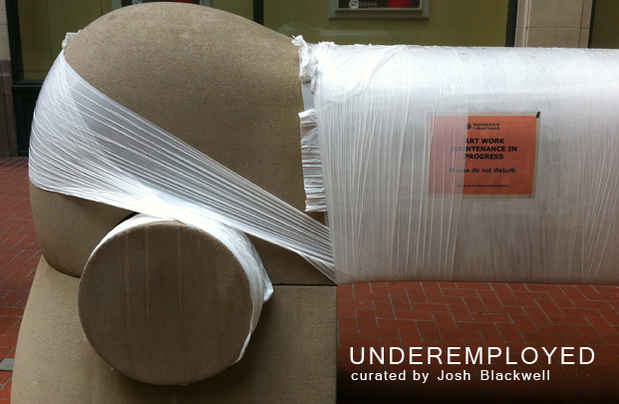"Underemployed" Exhibition
Zürcher Gallery

This event has ended.
“The ancient historians gave us delightful fiction in the form of fact; the modern novelist presents us with dull facts under the guise of fiction.” -Oscar Wilde, “The Decay of Lying: An Observation”
“function is excessive while frivolity is essential” -Lizzie Scott, “Styrene Fantastic Manifesto”
This exhibition was inspired by Oscar Wilde’s 1889 essay “The Decay of Lying: An Observation.” Wilde argues that art suffers when it is obliged to reflect and regurgitate reality. Forced to conform to arguments, ideas, and images that are currently circulating in the culture, art becomes “sterile and beauty will pass away from the land.” In the current era, it’s not difficult to find examples of this tendency. Culture wars, auction records, and spectacular art fairs frame discussions of art as salacious or mercenary. Meanwhile, high production values, provocative content and collaborative efforts are the well-worn pathways which mark artworks as luxurious, edgy, or politically aware. Wilde wrote his essay to protest an increasing demand for verisimilitude in the arts. Contemporary examples of this trend might include: the vogue for reality television, memoirs, and art as social practice. We look to art to confirm suspicions or settle scores; to reflect order back onto a world desperately attempting to see itself as orderly. But, as Wilde argues, art is not bound to fact or function, and the more it resists the pull of realism the better off it is.
Art doesn’t have to abide by the rules of reality - its logic is unique, even fantastical. Furthermore, it is suggested that in “lying” about the rules and laws that govern reality, certain truths are revealed that speak to who we are and how we conduct ourselves in a frenetic, pluralistic world. As Wilde says, “life imitates art far more than art imitates life.” The syntax of daily life is a recurring theme in much of the work here, but its logic has been scrambled, inverted, or refuted. In imagining an alternative reality, these artists are “liars” in the best sense of the term. They are transforming the familiar and rote into something remarkable and fantastic. Remarkable because we can still see the traces of reality despite their metamorphosis, and fantastic because the pedantic meanings of fact have been transcended.
Perhaps it’s stating the obvious to say that art has no practical function. Except that in practice we have a nasty habit of assigning a moral function to artworks. Museum education departments, grant applications, and senate subcommittees command artists to answer the question “what is your art for?” All too often they are looking for pat answers involving critiques of power, personal redemption, or popular entertainment. If great art imagines powerful and fabulous lies, why should artists be expected to rationalize their activities? I’m not arguing that artists shouldn’t be held accountable for their work; rather I am saying that if the moral disposition of art is all we choose to see perhaps we should reconsider what we are looking for when we look at art. All art is political, and in exploring topics such as waste, craft, and quotidian experience these artworks propose specific answers to the nebulous questions concerning art’s meaning and purpose. – Josh Blackwell
Media
Schedule
from November 15, 2011 to January 24, 2012
Opening Reception on 2011-11-15 from 18:00 to 20:00